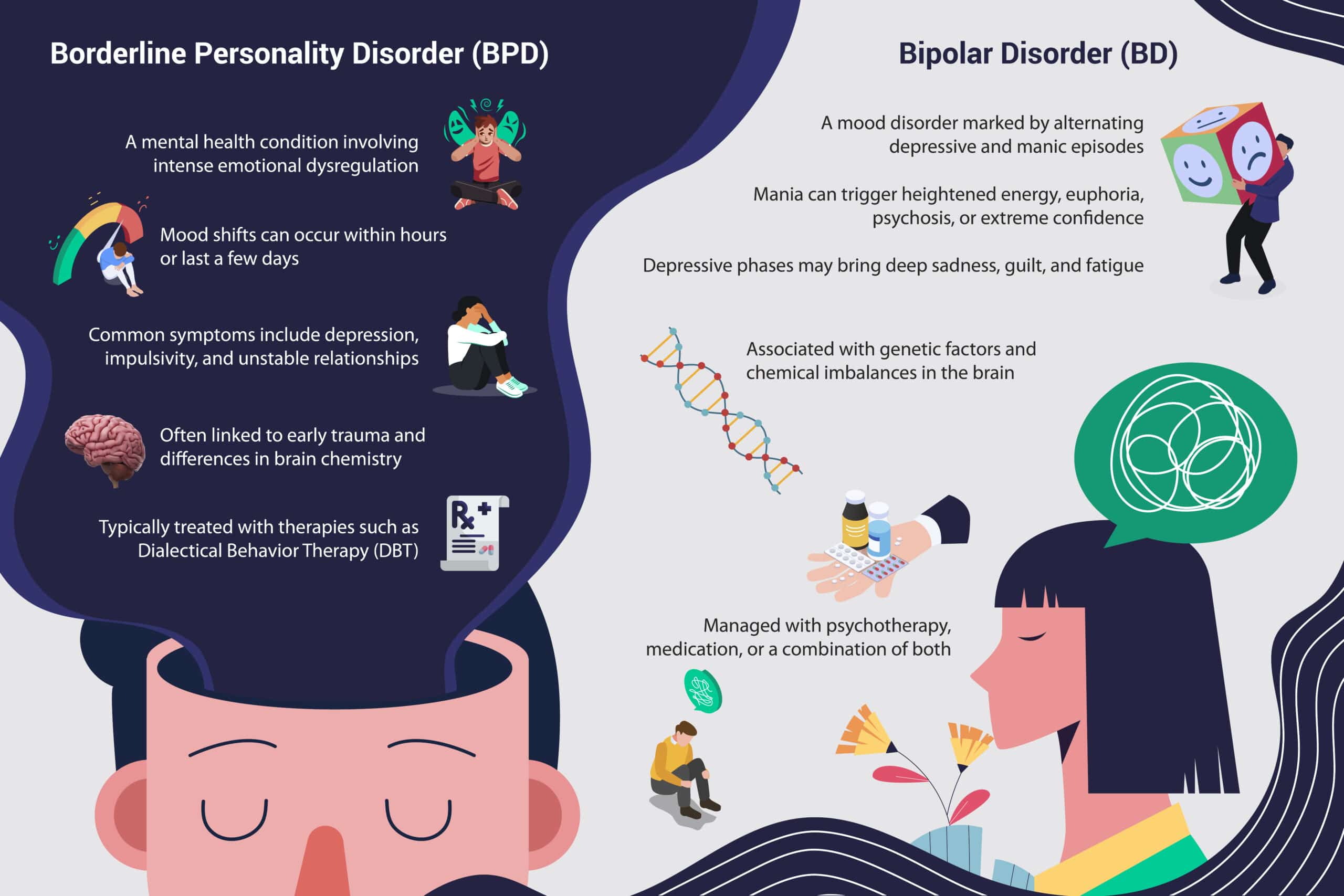Mood changes can sometimes be a normal reaction to stress. But for others, mood changes are so profound, they may signal conditions that are more serious, including borderline personality disorder (BPD) and bipolar disorder, both of which have mood swings as a key symptom.
Mental health can be tricky. If you’re questioning whether you or a loved one might be suffering from borderline personality disorder (BPD) or bipolar disorder, you’re not alone. The two conditions may appear similar at a glance, but have important differences. Understanding the differences can help get you or your loved one the right diagnosis and treatment.
Whether you’re looking for a psychiatrist for bipolar, searching for BPD treatment near me, or looking at online psychiatry services, the goal is the same, finding the right help for you.
Core Differences Between Borderline Personality Disorder and Bipolar Disorder
While both affect mood, thinking, and relationships, they are not the same illness.

- Borderline Personality Disorder (BPD) is a personality disorder. It mainly affects how you feel about yourself, how you relate to others, and how you handle emotions. Mood shifts in BPD can happen within hours or even minutes, often triggered by events or interactions.
- Bipolar Disorder is a mood disorder. It involves distinct episodes of mania or hypomania and depression. These episodes usually last days to weeks and are not always tied to external events.
If you’ve ever looked up a bipolar vs borderline chart, you’ve probably seen that the biggest difference is time frame, hours for BPD vs weeks for bipolar.
Symptom Patterns That Separate BPD from Bipolar Disorder
Emotional instability is a hallmark of BPD. People may feel intense anger, sadness, or anxiety that changes quickly. Relationships can be stormy because fears of abandonment are common. Impulsivity such as reckless spending, unsafe sex, or binge eating is often part of the picture.
Bipolar Disorder, on the other hand, features defined mood episodes. During mania or hypomania, you might feel overly energetic, euphoric, or irritable. You may need less sleep and have racing thoughts. Depressive episodes bring deep sadness, hopelessness, and fatigue.
If you’ve ever searched “BPD manic episode symptoms,” here’s the truth: BPD doesn’t cause true mania, but intense mood swings can feel similar from the outside.
How a Psychiatrist for Bipolar Approaches Diagnosis vs a BPD Specialist
A psychiatrist for bipolar focuses on identifying mood cycles how long they last, how long they last, how often they occur, and whether it has mania or hypomania. A psychiatrist who specializes in borderline personality disorder (BPD) will look at patterns in relationships, emotional regulation, and self-image
A psychiatrist specializing in borderline personality disorder will evaluate triggers, coping skills, and early life experiences. A psychiatrist treating bipolar near me or a psychiatrist specializing in BPD will make the distinction between the two diagnoses if they have the experience to do so.
If you’re looking for a psychiatrist treating bipolar near me or a psychiatrist BPD specialist near me, make sure they have experience differentiating between the two.
Why the Right Specialist Matters – Bipolar Specialist Psychiatrist vs Psychiatrist BPD Specialist Near Me
Misdiagnosis is quite common too. Someone with BPD is diagnosed with bipolar disorder, and vice versa. This results in ineffective treatment.
A bipolar specialist psychiatrist will focus on mood stabilization through medication and structured treatment, while a psychiatrist BPD specialist near me will emphasize an approach with individual therapy emphasizing emotional health and skill building, which would include Dialectical Behavior Therapy (DBT).
Treatment Differences – BPD Treatment Near Me vs Bipolar Care Plans
Treatment for BPD often includes:
- DBT to cope with intense emotions
- Cognitive Behavioral Therapy (CBT) to change negative thought patterns
- A trauma-focused clinician when relevant
Treatment for bipolar disorder typically includes:
- Mood stabilizers or antipsychotic medication
- Psychotherapy to address stress and lifestyle modifications
If you’re exploring BPD treatment near me, expect more therapy sessions and skill-building. If you’re seeing a psychiatrist bipolar disorder near me, medication will likely play a larger role.
Quiet BPD Treatment vs Depression in Bipolar Disorder
Quiet BPD is not explosive, but it is just as intense. Some individuals will utilize anger in an inward direction in a self-blaming way, that can often lead to guilt, and/or withdrawal. Sometimes this may look quite a lot like a bipolar episode of depression.
The biggest difference? For example, bipolar depression is part of a cycle and will alternate with mania or hypomania. In contrast, quiet symptoms of BPD are more likely to be triggered by interpersonal instability or stress.
A potential path to successful treatment of quiet BPD includes mindfulness-based therapies, self-compassion work, and trauma based therapeutic frameworks.
Online BPD Treatment vs Online Psychiatry Services for Bipolar
Virtual health care is on the rise. In many cases, online therapy for BPD is predominately based on engaging in DBT skills coaching, group therapy, and techniques for emotional regulation. Online psychiatry services for the treatment of bipolar disorder typically involve medication management, consistent tracking of mood states, and regular check-ins with a psychiatrist provider.
In summary, online mental health treatment for BPD has the ability to make good use of interactive therapy modalities, increasing the opportunity for engagement, whereas online bipolar disorder treatment will emphasize medication management and oversight by a psychiatrist (particularly with potential mood changes or as medication regimes may be altered).
Mental Health Clinic Near Me – In-Person Care for Accurate Diagnosis
Searching for a mental health clinic near me could represent the first step to gaining clarity. Face-to-face care provides at least three known advantages:
- An adequate psychiatric evaluation which will likely include a full DSM-5 examination.
- The ability to observe your mood and behavior in person.
- The opportunity to engage with multiple specialists at the same venue.
This hands-on approach reduces the risk of misdiagnosis especially in cases where symptoms of BPD and bipolar disorder overlap. Tracking patterns over time helps distinguish between emotional reactivity (BPD) and cyclical mood episodes (bipolar).
Where Does MindVibe Fits In?
MindVibe is committed to a personal, compassionate, and effective mental health care experience. We understand the fine line between BPD and bipolar disorder. We take the necessary time to get the diagnosis correct so you can begin receiving effective care straight away. Whether you need therapy, medication management, or both, MindVibe is committed to helping you feel stable, supported, and hopeful again.
FAQs
Can you have both BPD and bipolar disorder?
Yes. This is called a Dual Diagnosis and you will need to develop a treatment plan that addresses both issues.
How do I know if I have BPD or bipolar disorder?
A mental health professional can provide assessments and review your historical symptoms.
Is quiet BPD more common than typical BPD?
While quiet BPD receives less attention, it is not necessarily rarer, it is just more difficult to identify.
Which is worse, bipolar or BPD?
Neither is worse. Both issues can be very difficult; but both are treatable.
Can online treatment work for both conditions?
Yes. Many people receive effective online therapy or online psychiatry and many benefit from online care regardless of their location.









